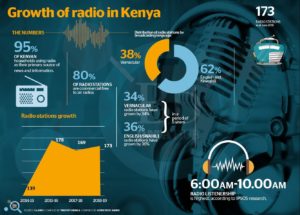
February 13, 2019//-As Kenya joins the rest of the globe to mark the 8th edition of World Radio Day on Wednesday, the focus will stay on the contributions of the most popular medium of mass communication.
The popularity of radio has grown over time and opened a window of immense opportunities in the socio-economic spheres reaching out to Kenyans who cannot afford television sets and other media.
From the old days when the nation only had one channel, then Voice of Kenya (VoK) that was largely used as a government mouthpiece, the number of radio stations has multiplied ten-fold since the liberalisation of airwaves in the 1990s and more Kenyans can listen to news and entertainment in their vernacular languages.
Data by the industry regulator, Communications Authority of Kenya (CA) shows that there are currently 169 radio stations with their ownership cutting across media houses, politicians and individual Kenyans.
The vernacular radios that spread into the most remote parts of the country are empowering Kenyans on the socio-economic and political discourse. The ordinary farmers in far-flung villages can now get tips on best crops for a particular soil type and advice on livestock rearing through the vernacular radio stations.

This represents a major shift from the past years where those without the basic understanding of the Swahili and English languages were left out leading to an over-reliance on the traditional farming methods that in turn hit crops and livestock production.
The International Livestock Research Institute (ILRI) said in a 2012 report that a majority of small-scale farmers rely on the radio to learn new techniques for boosting their crop and animal production.
The survey that sampled more than 600 farmers in Nakuru, Nyanza, Nyeri, Machakos, Makueni and Webuye, however, showed that the information was not enough to enable them to improve their food production practices and capacities.
The growth of FM radio stations, however, is a double-edged sword that calls for a delicate balancing act. The popular media that empowers people at the grassroots has also drawn an ugly side.
While the gains made by the radio industry are undeniably immense there is a growing concern that the stations had been used to fuel ethnic intolerance, especially during the electioneering periods.
Media Council chief executive David Omwoyo says the rise of the vernacular radios offers empowerment and cultural platforms but cautions that there is a need to keep them in check.
“Most of the stations are promoting local cultures and languages. We, however, have isolated cases where some are being used to malign other communities especially during the electioneering period,” Mr Omwoyo says.
For example, in 2007, much of the ethnic-based clashes in the Rift Valley were blamed on the reckless use of radio to stoke tensions and ridicule some tribes leading to the post-election violence.
The consequent arraignment of former radio presenter Julius Sang’ before the International Criminal Court (ICC) in 2012 brought vernacular stations under sharper scrutiny over their possible role in fanning political intolerance.
Determined to prevent a repeat of the 2007-08 events, security agencies started monitoring the vernacular stations to prevent them from broadcasting inflammatory statements from March 2017, months before the last General Election in August.
Given that about 95 per cent of Kenyan households use radio as their primary source of news and information, it’s an effective tool for politicians to reach out to the masses at the grassroots.
Professionalism, governance and funding are the biggest challenges facing the vernacular radio stations.
Mr Omwoyo adds that this leaves the medium vulnerable to people who use their financial clout to exploit the vernacular radio stations to drive their selfish agenda.
The council is developing a policy that will ensure an even distribution of the government’s advertising revenue, says Mr Omwoyo.
He says improving the stations’ professional standards will make it easier to attract government advertising millions that currently remain largely a preserve of the established media houses.
As the number of radio stations keeps growing and giving a voice to the masses, especially the vernacular media houses that have given nearly all ethnic groupings a chance to be heard, the opportunities and dangers are equally rising.
Today’s theme on dialogue, tolerance and peace in the use of popular medium calls for the society to use radio responsibly and ensure it does not serve subjective ethnic and political agenda that can spur violence like it did in the aftermath of 2007 General Election.
By John Mutua
This article was originally published on businessdailyafrica.com.


